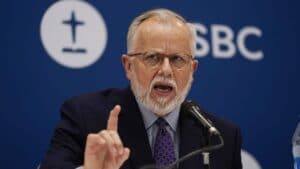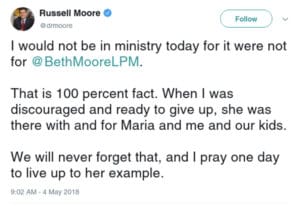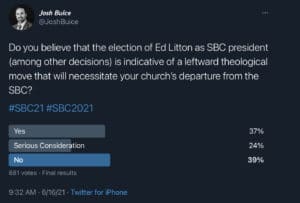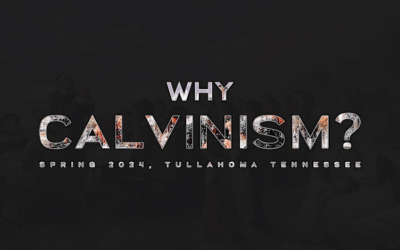SBC 2021: The Soft Baptist Convention
On the morning of June 16, following the presidential election results of the Southern Baptist Convention’s annual meeting, Josh Buice issued a poll question on Twitter. Buice, President of G3 ministries and a Southern Baptist pastor, asked:
“Do you believe that the election of Ed Litton as SBC president (among other decisions) is indicative of a leftward theological move that will necessitate your church’s departure from the SBC?”
Though Buice’s question is not one which would ever be officially polled by the SBC itself, it is the question many, both in and out of the SBC, are asking. What will local churches do in response to the events, decisions, resolutions, narrative, and overall tone of this momentous Convention?

Newly Elected SBC President Ed Litton
Buice’s poll question targets what many rightly see as the featured point of concern resulting from this Convention: the election of Ed Litton as its new president. His election, from before the closing gavel was pounded upon the rostrum, was being ideologically framed by the onlooking world. (“The world is watching” was so pronounced among the platform participants that it seemed to have been adopted as an official slogan, usurping the “Who’s Your One?” and the “Gospel Above All” monikers of the SBC’s recent past.)
Newsweek Magazine was watching. It featured a June 15 story entitled “Southern Baptist Convention Dodges Critical Race Theory Fight, Elects Moderate Ed Litton.” On The Hill website, a post was titled “Southern Baptist Convention elects new president, fends off far-right takeover.” The New York Times wrote “Southern Baptists Narrowly Head Off Ultraconservative Takeover.” The Wall Street Journal opined in an article as well, “Southern Baptist Convention Elects Ed Litton President in Victory for Moderate Forces.” From The Arizona Republic website comes the article entitled “Southern Baptists elect new convention president, bucking effort to push conservative denomination to the right.”
On and on the media reports go. Nearly all recognize, as does Buice, that the election of Ed Litton represents a decided rift that continues to grow within the denomination. It must not be misunderstood that in contemporary “news-speak” the appellation “moderate” is employed as a more palatable synonym for “liberal.” Biblical conservatives are defined as “far-right,” “ultraconservative,” and even considered “insurgents” in one story, while the liberal forces like Litton’s are termed “moderate.”
“Bubbas and Rednecks”
With the election of Ed Litton, the SBC has officially moved left. Ever linguistically capable in a nuanced, postmodern manner, the denominational elite continue to push the cliches of faith which, in the vernacular of one Russell Moore “leaked” letter, amount to “playing enough to the bubbas and the rednecks.” Because the engine of the SBC is fueled by the coffers of SBC churches, necessity demands the public employment of comforting and favorable cliches on the platform while destructing them in official policy arranged in green rooms, board rooms, and committee conclaves. Apparently, the “bubbas and rednecks” will keep paying if they’re just told what they want to hear up on the decks while down in the hold the elites are boring holes in the hull of the ship. But the faithful understand: A professed orthodoxy must be buttressed in an expressed orthopraxy. What is said must match what is done.
As Buice’s twitter poll directly points to the election of Litton as possible cause for church departures from the SBC, what specifically is represented by his election that might be so troublesome? There are at least three glaring takeaways which his election represents. These issues clearly reveal that the acronym SBC might more appropriately signify “Soft Baptist Convention.”
Soft On Theology
In the fourth century, 325 A.D., to be exact, the church was faced with a Trinitarian heresy known as Arianism. That particular heresy related to the charge that Jesus was not co-eternal with God the Father. It directly attacked the fundamental doctrine of orthodox Christianity, the doctrine of the Trinity. The result of the Council of Nicaea in combatting the heresy is known as The Nicene Creed, or more officially, The Niceno-Constantinopolitan Creed. It is a robust, biblically orthodox, and, by now, long held faithful statement on the Trinitarian doctrine of God.
Through the ages attacks, misunderstandings, and outright heresies have been introduced to the church regarding the doctrine of the Trinity. But flash forward from the 4th century to the 21st-century gathering of the world’s largest Protestant denomination. Such an attack on the Trinity, perhaps unintentionally, was nevertheless levied by the newly elected President of the SBC.
On the very day of Litton’s election to the presidency, the “We Believe” section of his church’s website contained the following statement.
“God is One, the Creator and Ruler of the universe. He has eternally existed in three persons: the Father, Son, and Holy Spirit. These three are co-equal parts of one God.”

Redemption Church Before & After
Litton and his church were professing nothing less than a heretical view of the Trinity. They were professing to believe what is technically known as Partialism, a Trinitarian heresy which, according to monergism.com, “taught that Father, Son and Holy Spirit together are components of the one God. This led [adherents] to believe that each of the persons of the Trinity is only one part God, only becoming fully God when they come together.”
On the day following Litton’s election, but prior to his official installation as President, Litton’s church website had changed the statement to read as follows: “God is One, the Creator and Ruler of the universe. He has eternally existed in three persons: the Father, Son, and Holy Spirit.”
This Trinitarian heresy on the part of Litton’s church was called out on social media on the first day of the Convention. On the second day of the Convention, the church suddenly, and with no explanation by Litton, changed what it believed. One messenger from the floor of the Convention even questioned Al Mohler as to his seminary’s teaching on the doctrine of God since Litton is a doctoral graduate of that Seminary. Mohler deferred to Litton who, he thought, would want to answer the question. Litton did not.
Numerous and serious questions ought be asked surrounding this doctrinal drama. Given that the professed belief of the entirety of Litton’s church changed overnight, was the church itself – its members, its leadership, etc. – informed and duly involved in altering this portion of their “We Believe” statement? Or, what seems more likely, was this merely doctrinal damage control arranged effectively ex cathedra by a pastor who simply couldn’t be – and clearly hadn’t been – bothered with the trivial details of doctrine?
Why was something as foundational as a nominee’s view, and that of his church, of the Trinity not vetted by opponents and allies prior to the election? Does this not merely indicate that the largest Protestant denomination on the planet, though it will frequently profess allegiance to the authority of Scripture, as well as to its own Baptist Faith And Message confessional statement, actually doesn’t expect anyone to abide by those standards? Doesn’t it simply show that, for all the chatter about the Bible, for the SBC the Bible’s doctrines are superfluous in light of more pressing ministerial matters at hand?
Indeed, Litton’s heresy, digital faux pas or not, reveals one thing that must not go unnoticed. It reveals that, for the majority of the SBC, apparently doctrine truly does not matter. It reveals that the SBC has gone soft on theology. The world wasn’t watching this eruption of theological softness, but we can be certain, God was – and is. The SBC’s behavior, as reflected in this matter, does not match its profession. If a church pastor and his church’s members, a denominational president, indeed an entire denomination, can be this casually imprecise about the very ontology of God, should not all its other doctrines, in both profession and practice, not be carefully scrutinized? Again, the world isn’t watching this, but faithful saints are. And so is our Lord.
Soft On Complementarianism
Any reasonably aware onlooker of evangelicalism will recognize the growing debate regarding women in ministry. The burgeoning influence of both feminism and intersectionality has fostered much dialogue about the roles, rights, and responsibilities of women within official church ministry.
It was merely 2018 when the Southern Baptist Convention swirled with chatter about electing Beth Moore, now  departed from its ranks, to its presidency. Russell Moore, also now departed from the SBC, famously declared in 2019 that “an SBC that doesn’t have a place for Beth Moore doesn’t have a place for a lot of us.” With regards to Beth Moore, prior to her departure but during the midst of the debate in which she was central, Litton defended her against detractors stating that many were “fighting battles we shouldn’t fight.”
departed from its ranks, to its presidency. Russell Moore, also now departed from the SBC, famously declared in 2019 that “an SBC that doesn’t have a place for Beth Moore doesn’t have a place for a lot of us.” With regards to Beth Moore, prior to her departure but during the midst of the debate in which she was central, Litton defended her against detractors stating that many were “fighting battles we shouldn’t fight.”
While that accepting “place,” as the SBC’s former chief ethicist called it, may have not remained for those two unrelated Moores, that “place” most surely does persist within some churches of the SBC. Most notably, the place for women in the pulpit, and those who support an ecclesiastical egalitarian position, can be found merely by glancing at the new SBC President’s own church. Litton has, on more than a few occasions, co-preached alongside his wife, Kathy Litton. While we would rightly argue that what they were doing did not technically or biblically qualify as preaching, it is nevertheless the case that they jointly presumed to proclaim “Thus Saith The Lord” to the gathered assembly of believers.
A multitude of issues are in play as a result of this clear violation of Scripture. The ordering of not only the church, but the family and society itself, are inverted when the creation-established guidelines of God’s Word are left unattended or, in Litton’s case, expressly disregarded. A church with a woman pastor is not a church and any woman who claims to be a pastor is not.
Contrary to unbiblical egalitarian arguments, God is not showing favor by permitting the growing prevalence of women in the pulpit. Instead, it is the judgment of God being made manifest, per Romans 1, by giving them over to their sin. In the case of women preaching, the aggravated, though culturally approved, persistence of such a behavior doesn’t not reflect God’s favor by its continuance, but His judgment through its continuance. A woman taking authority over men in such a capacity is clearly contrary to Scripture and therefore is sin. For the church or denomination that readily accepts it, they are being “given over.”

Ed & Kathy Litton Co-Preaching
Yet for all the blustering, posturing, and pro-women-preacher digital ink spilled pushing the egalitarian narrative, the topic itself went largely and unofficially unattended at this SBC. Though he overtly claimed, in a pre-convention statement given to the Council On Biblical Manhood And Womanhood, that “At Redemption church, we do not have women preach,” Litton’s undisguised deception garnered no convention attention. Given, however, that the SBC elected a man with clear egalitarian behavior, the topic was implicitly addressed, and it was implicitly accepted.
That Litton preached alongside his wife was not an unknown when Convention time rolled around. It was known. It just wasn’t featured. The sole challenge issued that would have been seen in support of the SBC’s reputed, long-standing complementarianism was offered from the floor by one messenger. A Lousiana pastor made the following motion:
“I move that we, the SBC, would break fellowship with Saddleback Church as they have ordained three ladies as pastors, and all other churches that would choose to follow this path. At the very least, I am asking that the validity of this matter be looked into and a report given at the 2022 convention.”
Saddleback Church, an SBC church pastored by Rick Warren, ordained three women into ministry in May 2021. In response to the messenger’s motion about this matter, presiding President J.D. Greear advised that the pastor should refer it to a separate credentials committee and quickly moved to other business.
It is probably safe to say that, while complementarianism may be technically alive in the SBC, it is with no lack of parliamentarian rapidity that its discussion was tabled and obscured. In view of its new President’s past performance, the doctrine may well find itself dying the ignoble death of unemployed obscurity. The world may be watching and applauding such kowtowing to feminism, but the Lord is watching too. And He will not look favorably on those who willfully subvert His creation-mandated order.
 Soft On Critical Race Theory
Soft On Critical Race Theory
This year’s SBC Convention was attended by over 15,000 messengers. The last Convention close to those numbers was the 1996 New Orleans Convention with over 13,000 messengers. This year’s convention was so heavily populated because of one driving issue: critical race theory and intersectionality. However, it seems this featured impetus was disregarded as important by the denomination’s own Executive Committee. It has been stated that an EC meeting prior to the start of the Convention found Ronnie Floyd, the Committee’s President and CEO, opining that reasons for the large turnout this year included the fact that the 2020 Convention was skipped due to the Covid pandemic, that the EC had done such a good job promoting this year’s gathering, and that Baptists simply just missed getting together.
Ronnie was wrong. The single issue which drove attendance at this gathering was the pronounced biblical threat represented by critical race theory and intersectionality. The 2019 SBC Convention, through its Resolutions Committee, had forced through the adoption of the now infamous Resolution 9 which expressly endorsed CRT/I as “helpful analytical tools.” Though an attempt was made at the 2019 Convention to amend Resolution 9 to correctly identify it as contrary both to Scripture and the denomination’s own statement of faith, those measures failed. An ignorant messenger base, far too trusting of its committees, adopted the Resolution. Critical race theory and intersectionality had been given an official denominational nod.
As Providence so orchestrated it, the SBC was unable to meet during the pandemic year of 2020. This hiatus allowed many  faithful pastors within the SBC to embark on what was largely a ministry of education, seeking to teach SBC pastors and churches what, in fact, the 2019 Convention had done. Notable among this effort to contend for the faith against CRT/I was Founders Ministries. Founders produced a feature-length cinedoc, By What Standard?, which analyzed the very real dangers of the cultural Marxist ideology of CRT/I. Through its documentary, numerous blog posts, scores of podcasts, and a couple of conferences, Founders’ mission was galvanized against CRT/I, and it seemed tireless in combatting the threat that had now been officially approved by the SBC. (By contrast, a search on Baptist Press, the official media outlet of the SBC, reflects merely 37 articles returned from a search for “critical race theory.” A similar search for “racial reconciliation” returns over 600 pages of hits.)
faithful pastors within the SBC to embark on what was largely a ministry of education, seeking to teach SBC pastors and churches what, in fact, the 2019 Convention had done. Notable among this effort to contend for the faith against CRT/I was Founders Ministries. Founders produced a feature-length cinedoc, By What Standard?, which analyzed the very real dangers of the cultural Marxist ideology of CRT/I. Through its documentary, numerous blog posts, scores of podcasts, and a couple of conferences, Founders’ mission was galvanized against CRT/I, and it seemed tireless in combatting the threat that had now been officially approved by the SBC. (By contrast, a search on Baptist Press, the official media outlet of the SBC, reflects merely 37 articles returned from a search for “critical race theory.” A similar search for “racial reconciliation” returns over 600 pages of hits.)
Litton MIA on CRT?
But Buice’s twitter survey was specifically framed within the context of Ed Litton’s election as President. So the question is, where is Ed on the issue which drove so many SBC’ers to this year’s Convention? To be lenient, one might say Ed was missing in action on CRT for there is very little extant commentary from him on the topic. But to be correct, one would have to say, Ed’s not MIA on CRT, Ed’s undercover for CRT.
In December 2020, the Presidents of the six SBC seminaries collectively issued a statement which both asserted the Baptist Faith and Message confessional statement as a “classic statement of biblical faith,’ and unequivocally declared that “affirmation of Critical Race Theory, Intersectionality, and any version of Critical Theory is incompatible with the Baptist Faith And Message.” While that bold, collective clarity would’ve been more useful at the 2019 Convention when Resolution 9 was adopted, it nevertheless caused no small debate within the SBC.
In response to the Seminary Presidents’ statement, at least two black pastors left the convention, Charlie Dates of Chicago’s  Progressive Baptist Church and Ralph West of Houston’s The Church Without Walls. Marshall Ausberry, then head of the National African American Fellowship of the SBC and the Convention’s 1st VP, expressed disappointment with the Seminary Council’s statement. Ausberry would tweet in February 2021 that “to reject Res 9 rejects the AA life experience and AA personhood.”
Progressive Baptist Church and Ralph West of Houston’s The Church Without Walls. Marshall Ausberry, then head of the National African American Fellowship of the SBC and the Convention’s 1st VP, expressed disappointment with the Seminary Council’s statement. Ausberry would tweet in February 2021 that “to reject Res 9 rejects the AA life experience and AA personhood.”
Another very vocal pastor on the matter of CRT, and particularly the Seminary Presidents’ statement, is Dwight McKissic. He produced a lengthy diatribe which included the threat of his Texas’ church’s exit from the SBC saying, “as for me and my house – if the major thesis and thrust of Resolution 9, passed by a majority in Birmingham 2019, is gutted or rescinded – we will exclusively align with the National Baptist Convention and the Baptist General Convention of Texas.” 
One other influential Southern Baptist pastor must be noted in this response to the Seminary Presidents’ statement. Fred Luter, the SBC’s first and only black president, dissented to the statement by the seminary presidents. His dissent came as Dates and West each led their churches to their SBC egress. In particular response to the statement, Luter joined with a chorus of other SBC pastors and members in signing a rebuttal statement. A Statement on Justice, Repentance, and the SBC includes the charge that “the actions of some in the SBC appear to be more concerned with political maneuvering than working to present a vibrant, gospel-loving, racially and culturally diverse vision.” This reactive statement further states, “Further, we stand firmly in opposition to any movement in the SBC that seeks to distract from racial reconciliation through the gospel and that denies the reality of systemic injustice.”
Now we arrive at the undercover status of Ed Litton as it pertains to CRT. Fred Luter, a vocal, platformed, former SBC President who is in support of Resolution 9 and the reactive statement against the seminary president’s disavowal of CRT, is the man who nominated Ed Litton for the 2021 SBC Presidency. Additionally, alongside Fred Luter, Dwight McKissic, and Marshal Ausberry as signatories to the statement is “Rev. Ed Litton, Pastor, Redemption Church, Saraland, AL.”
Liberal Litton is not a stalwart standing firm against the onslaught of CRT within the SBC. Despite a May 2021 report which states that “candidate Ed Litton claimed anyone who thinks Critical Race Theory is a problem in the SBC believes a conspiracy theory,” his political posturing is clear. If there is a CRT conspiracy in the SBC, Litton is expressly facilitating it and has now officially benefitted from it. He wouldn’t be the new SBC President otherwise.
What’s It Mean?
The 2021 Southern Baptist Convention, now under the helm of a decidedly liberal president, has gone soft. It has gone soft on doctrine, as is evidenced by its president’s evident disregard for theological precision on his own church’s website. It has gone soft on complementarianism by the election of a man who has co-preached with his wife. It has gone soft on critical race theory, the most direct, frontal assault on the Christian faith and gospel which most of us have seen in our lifetimes. That denominational CRT softness is epitomized in Litton, who would not have gained the presidency were it not for the pro-CRT forces aligned behind him.
The results of Buice’s twitter poll, unscientific though they are, are nonetheless telling. Of 881 responses to his question, 37% answered “Yes.” Another 24% responded “Serious Consideration.” Thirty-nine percent responded “No.” In terms of just raw numbers, (again, unscientific – some votes may represent the same church) the “Yes” and “Serious Consideration” collectively and potentially represent over 500 churches that either will or will consider leaving the SBC after this Convention.
Regardless of the results of a twitter poll, the question must be considered by any pastor, church, and SBC member. What do we do now? Do we leave a convention that has decidedly turned left or do we stay and fight? While there are valid arguments on either side of that very serious matter, just remember: a local church does not need a national denomination, but the national denomination needs the local church.
As Darrell Harrison astutely tweeted, “SBC = Suicide By Compromise.” Harrison is right. Compromise on theology, compromise on doctrine, compromise on false teaching, and compromise on Scriptural authority will represent nothing less than denominational suicide. Churches must ask themselves whether they will die on the hill alongside compromise or “come out from among them.” (2 Cor. 6:14-18) The SBC is soft. Its faithful churches must not be.






0 Comments